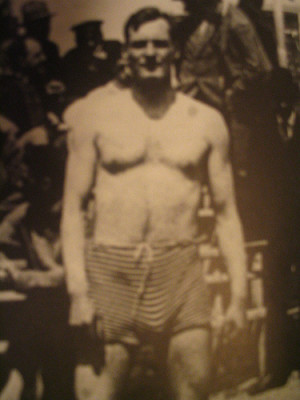ARTHUR CRAVAN, one of the legendary quartet of iconoclasts identified by Roger Conover in his 1995 classic 4 Dada Suicides (the others being Jacques Rigaut, Jacques Vaché, and Julien Torma) exacted a spectacular revenge against the tuxedoed savage who had defamed and bankrupted his uncle, Oscar Wilde. Cravan, regarded as a proto-dada, or perhaps dada’s premature embodiment, was born Fabien Avenarius Lloyd in Lausanne, Switzerland on May 22, 1887. Lausanne is about two and a half hours southwest of Zurich where the parturient pangs and polyglossic noise of dada would trouble the tavern walls of the Cabaret Voltaire in 1916. André Breton referred to Cravan’s life as “the single best barometer for measuring the impact of the avant-garde between 1912-1917.” It is worth noting that the posthuman zoological language/poetry of Hugo Ball, Tristan Tzara and others at the Cabaret arose at the same time in 1916 Zurich as the posthumous publication of Swiss linguist Ferdinand de Saussure’s seminal Course in General Linguistics, and that this strange autonomous zone, harboring the dadas and Lenin against shellshock and evisceration, was the roped off ring where language, the word, was dealt clinical blows, knocking out its mouth guard and removing its senses.
Cravan’s father, Otho Lloyd, was the brother of Oscar Wilde’s beard/wife Constance; therefore, Cravan was Wilde’s nephew. Throughout his turbulent and transnational life, Cravan assumed and performed multiple aliases, of which several —Dorian Hope, Sebastian Hope and B. Holland— are Wilde-related or Wilde-derived. Cravan’s exploits are noted in detail elsewhere, and Conover’s book remains an exemplary source, but aside from his enigmatic suicide/disappearance off the coast of Mexico in 1918 and various reports of his return from the grave, perhaps Cravan’s greatest succès de scandale was his posthumous encounter with his uncle in Oscar Wilde est Vivant! (Oscar Wilde Lives!), published in Cravan’s own scabrous art-tabloid Maintenant in 1913. This account, written thirteen years after Wilde’s death was the literary hoax precursor of the Orson Wells/Mercury Theater broadcast of H.G. Wells’ War of the Worlds in that it sent reporters scurrying from New York to Paris to investigate Wilde’s resurrection.
The other of Arthur Cravan’s greatest affronts was his self-defined profession of ‘poet and boxer.’ Cravan was, like his uncle, prodigiously tall. Yet, going further than his uncle, Cravan added the role of prizefighter to those things that he and Wilde had in common: dandy, flâneur, poet, and sexual outlaw. It will be remembered that Wilde had been destroyed by John Douglas, the 9th Marquis of Queensbury, who endorsed —but did not devise— the classic rules of boxing: the Queensbury Rules. Wilde’s lover, Lord Alfred ‘Bosie’ Douglas, was one of Queensbury’s sons. Disgusted by the affair, Queensbury left a calling card for Wilde, which —depending on deciphering the scrawled message upon it— referred to Wilde as either a “posing somdomite” (sic) or “ponce and somdomite” (sic). Accused of a crime, Wilde, somewhat recklessly, sued Queensbury for libel. The collapse of Wilde’s case does not require reconstruction here, but the trial of 1895 led ultimately to Wilde’s bankruptcy, arrest on charges of gross indecency, and his imprisonment, as well as Queensbury’s exoneration.
It is my contention that Arthur Cravan’s ambivalent burlesque of boxing was —as was typical of his style— a public insult and act of revenge against the Marquis of Queensbury. For Cravan, the boxing ring was another stage where he could erase the lines between discipline and anarchy, and in doing so, he mocked Queensbury, and avenged his uncle. Extant film footage of Cravan boxing shows him fending off a diminutive opponent in a deliberately absurd exhibition fight. This may have been the source material for Peter Cooke and Dudley Moore’s reminiscent sketch in the first episode of Peter Cook and Dudley Moore’s 1965 TV show Not Only, But Also featuring a boxing match between Cook’s dandy Gentlemen Jim ‘The Torquay Stylist’ and Moore’s ‘The Dagenham Dodger.’ The zenith of Cravan’s ironic career as poet and boxer was his bout with exiled World Heavyweight Champion Jack Johnson in Barcelona on April 23, 1916, a ‘collaboration’ between two outrageous artists staged to save both from penury, and to afford Cravan his passage to New York (with Leon Trotsky as his fellow passenger). Cravan almost certainly arrived drunk at ringside for the fight, and various accounts have him avoiding knockout for between three and six rounds. The fight exemplified the theatrics of transgression at which Cravan excelled: a multiple affront to Johnson’s persecutors in that he still had a friend in the queer figure of Cravan, to boxing in that it emphasized the ‘fix,’ and by extension to Queensbury and his formalist rules. Arthur Cravan whose disputed death/disappearance/suicide continues to vex those in his corner and his opponents in equal measure, transgressed all boundaries of art, sexuality, nationality, sportsmanship and identity. He was the Heavyweight Champion of the subtext, the ulterior motive, and of dada.



